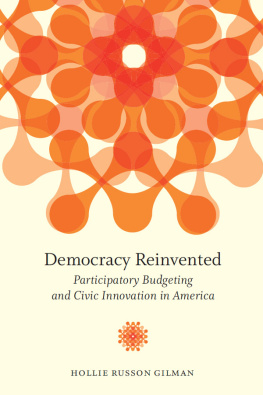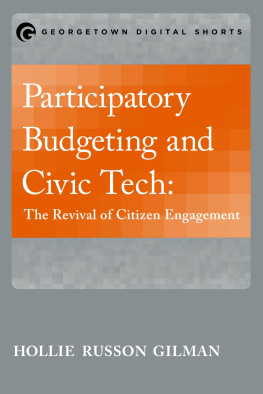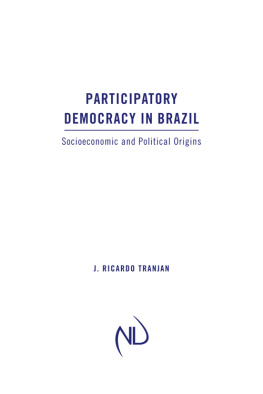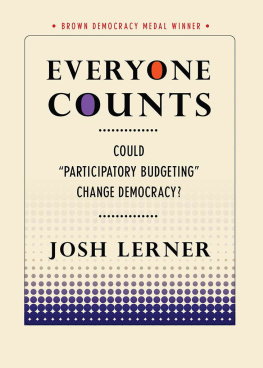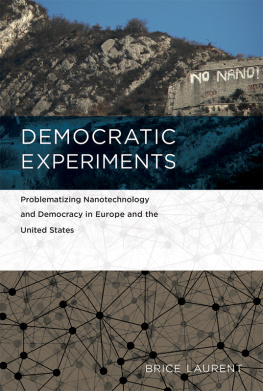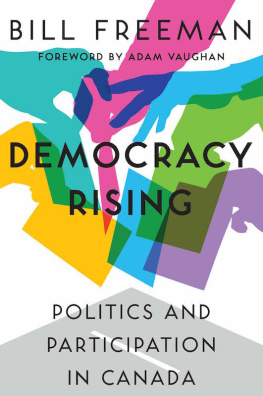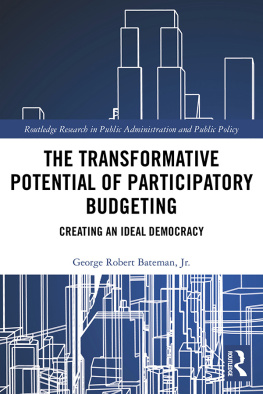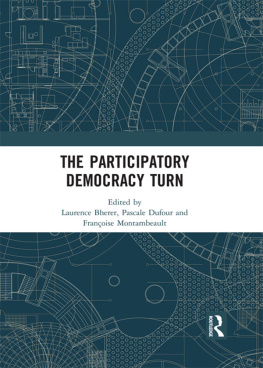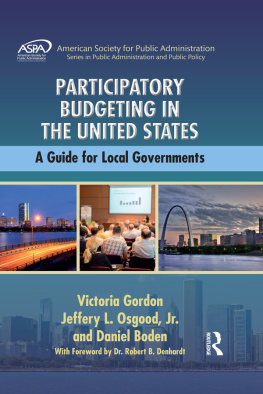INNOVATIVE GOVERNANCE IN THE 21ST CENTURY
ANTHONY SAICH
Series editor
This is the ninth volume in a series that examines important issues of governance, public policy, and administration, highlighting innovative practices and original research worldwide. All titles in the series will be copublished by the Brookings Institution Press and the Ash Center for Democratic Governance and Innovation, housed at Harvard University's John F. Kennedy School of Government.
Decentralizing Governance: Emerging Concepts and Practices
G. Shabbir Cheema and Dennis A. Rondinelli, eds. (2007)
Innovations in Government: Research, Recognition, and Replication
Sandford Borins, ed. (2008)
The State of Access: Success and Failure of Democracies to Create Equal Opportunities
Jorrit de Jong and Gowher Rizvi, eds. (2008)
Unlocking the Power of Networks: Keys to High-Performance Government
Stephen Goldsmith and Donald F. Kettl, eds. (2009)
Ports in a Storm: Public Management in a Turbulent World
John D. Donahue and Mark H. Moore, eds. (2012)
Agents of Change: Strategy and Tactics for Social Innovation
Sandeijn Cels, Jorrit de Jong, and Frans Nauta (2012)
The Persistence of Innovation in Government
Sanford Borins (2014)
The PerformanceStat Potential: A Leadership Strategy for Producing Results
Robert D. Behn (2014)
Democracy Reinvented: Participatory Budgeting and Civic Innovation in America
Hollie Russon Gilman (2016)
Copyright 2016
ASH CENTER FOR DEMOCRATIC GOVERNANCE AND INNOVATION
Harvard University
All rights reserved. No part of this publication may be reproduced or transmitted in any form or by any means without permission in writing from the Brookings Institution Press, 1775 Massachusetts Avenue, N.W., Washington, D.C. 20036, www.brookings.edu.
The Brookings Institution is a private nonprofit organization devoted to research, education, and publication on important issues of domestic and foreign policy. Its principal purpose is to bring the highest quality independent research and analysis to bear on current and emerging policy problems. Interpretations or conclusions in Brookings publications should be understood to be solely those of the authors.
Library of Congress Cataloging-in-Publication data
Names: Gilman, Hollie Russon.
Title: Democracy reinvented : participatory budgeting and civic innovation in America / Hollie Russon Gilman.
Description: Washington, D.C. : Brookings Institution Press, 2016.
Identifiers: LCCN 2015029122| ISBN 9780815726821 (paperback) | ISBN 9780815726838 (epub) | ISBN 9780815726845 (pdf)
Subjects: LCSH: BudgetUnited StatesCitizen participation. | DemocracyUnited States. | BISAC: POLITICAL SCIENCE / Civics & Citizenship. | POLITICAL SCIENCE / Public Policy / Economic Policy. | BUSINESS & ECONOMICS / Economics / General. | POLITICAL SCIENCE / Public Policy / General.
Classification: LCC HJ2051 .G49 2016 | DDC 352.4/80973dc23 LC record available at http://lccn.loc.gov/2015029122
9 8 7 6 5 4 3 2 1
Typeset in Adobe Garamond
Composition by Westchester Publishing Services
For my parents, Gail M. Russon and Stephen Gilman
Acknowledgments
This work is a result of a collective effort spanning several cities, institutions, and mentors. Throughout, I have felt enormously lucky to have a network of support, expertise, and guidance.
This book took a tremendous amount of nurturing (from the academy to the field to policy and back to thinking and experimentation). It originated at the John F. Kennedy School of Government's Ash Center for Democratic Governance and Innovation at Harvard University. The ideas presented in this book originated there, and my growth as a person and as a thinker was nurtured and supported.
I am indebted to my dissertation committee members Archon Fung, Claudine Gay, and Dennis Thompson. Claudine Gay inspired me to believe my doctoral program was a place I could pursue my passions. Dennis Thompson's commitment to the values of deliberative democracy formed and fueled those passions. Archon Fung's advice and example taught me a great deal about how to approach the world: with critical analytic insight, a spirit of collaboration, and kindness to all.
I benefited from several courses at Harvard that provided fertile learning ground and influenced my worldview as well as from conversations with individuals who included Eric Beerbohm, Yochai Benkler, Nolan Bowie, Susan Crawford, Ryan Enos, Peter Hall, Jennifer Hochschild, Marshall Ganz, Larry Lessig, Jane Mansbridge, Nancy Rosenblum, Michael Sandel, Roberto Unger, Tom Wall, to name but a few.
The inspiration, incubation, and sustained support for this research comes from Harvard's Ash Center. Special thanks to Tim Burke, Elena Fagotto, Gigi Georges, Daniel Harsha, Bruce Jackan, Christina Marchand, Marty Mauzy, Kara OSullivan, Francisca Rojas, Jennifer Shkabatur, and Juanne Zhao.
New York University's Governance Lab (GovLab) inspired me to believe that this book was a worthy endeavor, one that could serve as part of a larger conversation about open governance and civic innovation. Special thanks to Beth Noveck, Shankar Prasad, and Stefaan Verhulst for their kindness, support, talent, and sense of fun. This book would not exist without their visionary thinking in the emerging field of open government. I thank them for their personal encouragement.
I am indebted to New America and the Open Technology Institute, where I learned about the nuances of the digital era, especially the necessary challenge involved in bridging the realms of technology and public policy. Particular thanks to Anne-Marie Slaughter, Alan Davidson, Reid Cramer, Mark Schmitt, Alissa Black, Georgia Bullen, and Laurenellen McCann.
I was lucky to receive detailed feedback, edits, and comments on this manuscript from Michael Freedman-Schnapp, Adam Lebowitz, Matt Leighninger, Josh Lerner, Carolyn Lukensmeyer, Quinton Mayne, Tiago Peixoto, K. Sabeel Rahman, Donata Secondo, Carmen Sirianni, Paolo Spada, Jannon Stein, Brian Wampler, and Sondra Youdelman. I am grateful for their editing inputs.
Without the early inspiration of faculty at the University of Chicago, including Charles Lipson, John Mearsheimer, Herman Sinaiko, and many others, I may have failed to acquire a belief in the power of ideas and the value of political science and theory to improve society. Michael Dawson opened my eyes to the world of graduate school and to an awareness of the intersection of technology and democracy. I remain grateful for their support.
I am fortunate to have the wisdom offered by, and the faith and support of, a variety of advisers, thought leaders, and collaborators. These include my passionate colleagues at the Office of Science and Technology Policy: Todd Park, Tom Kalil, Nick Sinai, Katie Dowd, John Farmer, Brian Forde, Vivian Graubard, Raph Majma, Marina Martin, Jen Pahlka, Ryan Panchadsaram, Doug Rand, Aden Van Noppen, and Nicole Wong. My thanks to the entire Open Government team, including Lisa Ellman and Remington Gregg, as well as to those in the broader community, including Anna Burger, Tom Glaisyer, Hahrie Han, Ginny Hunt, Dave Karpf, Kate Krontiris, Jed Miller, Tina Nabatchi, Andrew Rasiej, Alec Ross, Andrea Batista Schlesinger, Pat Scully, Micah Sifry, Matt Stempeck, Nicole Summers, Martin Tisne, Ari Wallach, and Darrell West. I remain grateful for several edits to earlier versions, including from Lindsay Brine, Phil Caruso, Jennifer Glickel, Samantha Gordon, and Erin Nitti. I am also appreciative for the support I received from William Finan, Janet Walker, and C. Elliott Beard at Brookings Press, and Melody Negron at Westchester Publishing Services.

